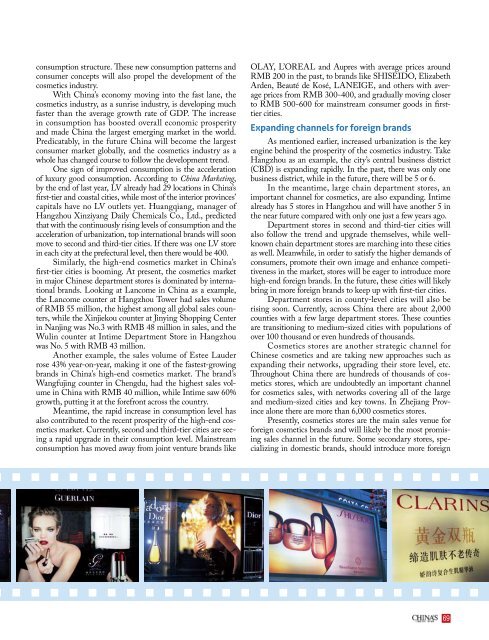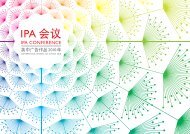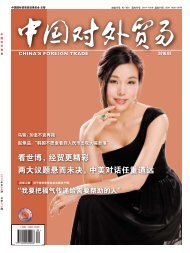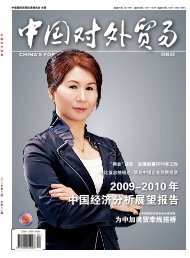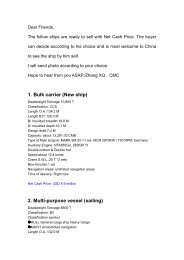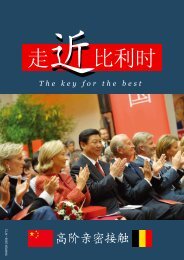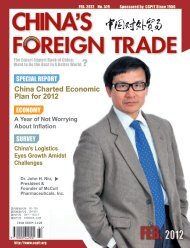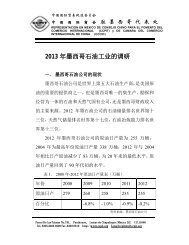Create successful ePaper yourself
Turn your PDF publications into a flip-book with our unique Google optimized e-Paper software.
consumption structure. These new consumption patterns and<br />
consumer concepts will also propel the development of the<br />
cosmetics industry.<br />
With China’s economy moving into the fast lane, the<br />
cosmetics industry, as a sunrise industry, is developing much<br />
faster than the average growth rate of GDP. The increase<br />
in consumption has boosted overall economic prosperity<br />
and made China the largest emerging market in the world.<br />
Predicatably, in the future China will become the largest<br />
consumer market globally, and the cosmetics industry as a<br />
whole has changed course to follow the development trend.<br />
One sign of improved consumption is the acceleration<br />
of luxury good consumption. According to China Marketing,<br />
by the end of last year, LV already had 29 locations in China’s<br />
first-tier and coastal cities, while most of the interior provinces’<br />
capitals have no LV outlets yet. Huangqiang, manager of<br />
Hangzhou Xinziyang Daily Chemicals Co., Ltd., predicted<br />
that with the continuously rising levels of consumption and the<br />
acceleration of urbanization, top international brands will soon<br />
move to second and third-tier cities. If there was one LV store<br />
in each city at the prefectural level, then there would be 400.<br />
Similarly, the high-end cosmetics market in China’s<br />
first-tier cities is booming. At present, the cosmetics market<br />
in major Chinese department stores is dominated by international<br />
brands. Looking at Lancome in China as a example,<br />
the Lancome counter at Hangzhou Tower had sales volume<br />
of RMB 55 million, the highest among all global sales counters,<br />
while the Xinjiekou counter at Jinying Shopping Center<br />
in Nanjing was No.3 with RMB 48 million in sales, and the<br />
Wulin counter at Intime Department Store in Hangzhou<br />
was No. 5 with RMB 43 million.<br />
Another example, the sales volume of Estee Lauder<br />
rose 43% year-on-year, making it one of the fastest-growing<br />
brands in China’s high-end cosmetics market. The brand’s<br />
Wangfujing counter in Chengdu, had the highest sales volume<br />
in China with RMB 40 million, while Intime saw 60%<br />
growth, putting it at the forefront across the country.<br />
Meantime, the rapid increase in consumption level has<br />
also contributed to the recent prosperity of the high-end cosmetics<br />
market. Currently, second and third-tier cities are seeing<br />
a rapid upgrade in their consumption level. Mainstream<br />
consumption has moved away from joint venture brands like<br />
OLAY, L’OREAL and Aupres with average prices around<br />
RMB 200 in the past, to brands like Shiseido, Elizabeth<br />
Arden, Beauté de Kosé, Laneige, and others with average<br />
prices from RMB 300-400, and gradually moving closer<br />
to RMB 500-600 for mainstream consumer goods in firsttier<br />
cities.<br />
Expanding channels for foreign brands<br />
As mentioned earlier, increased urbanization is the key<br />
engine behind the prosperity of the cosmetics industry. Take<br />
Hangzhou as an example, the city’s central business district<br />
(CBD) is expanding rapidly. In the past, there was only one<br />
business district, while in the future, there will be 5 or 6.<br />
In the meantime, large chain department stores, an<br />
important channel for cosmetics, are also expanding. Intime<br />
already has 5 stores in Hangzhou and will have another 5 in<br />
the near future compared with only one just a few years ago.<br />
Department stores in second and third-tier cities will<br />
also follow the trend and upgrade themselves, while wellknown<br />
chain department stores are marching into these cities<br />
as well. Meanwhile, in order to satisfy the higher demands of<br />
consumers, promote their own image and enhance competitiveness<br />
in the market, stores will be eager to introduce more<br />
high-end foreign brands. In the future, these cities will likely<br />
bring in more foreign brands to keep up with first-tier cities.<br />
Department stores in county-level cities will also be<br />
rising soon. Currently, across China there are about 2,000<br />
counties with a few large department stores. These counties<br />
are transitioning to medium-sized cities with populations of<br />
over 100 thousand or even hundreds of thousands.<br />
Cosmetics stores are another strategic channel for<br />
Chinese cosmetics and are taking new approaches such as<br />
expanding their networks, upgrading their store level, etc.<br />
Throughout China there are hundreds of thousands of cosmetics<br />
stores, which are undoubtedly an important channel<br />
for cosmetics sales, with networks covering all of the large<br />
and medium-sized cities and key towns. In Zhejiang Province<br />
alone there are more than 6,000 cosmetics stores.<br />
Presently, cosmetics stores are the main sales venue for<br />
foreign cosmetics brands and will likely be the most promising<br />
sales channel in the future. Some secondary stores, specializing<br />
in domestic brands, should introduce more foreign<br />
69


